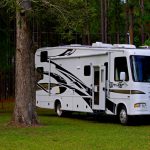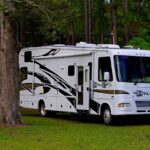Ever dreamed of trading your house keys for a camper door latch and hitting the open road? The camper lifestyle promises freedom, adventure, and a minimalist dream come true. But before you pack your bags and downsize your life, there’s a less glamorous side to this nomadic existence that many don’t talk about. From cramped quarters that test your patience to unpredictable plumbing nightmares and the constant quest for reliable internet, living in a camper is as challenging as it is thrilling.
Did you know over 1 million Americans now live full-time in RVs, yet many face hidden struggles that can make or break their experience? Stick around as we unpack the 10 surprising disadvantages of living in a camper — and share insider tips from RV Brands™ to help you navigate these hurdles with confidence. Whether you’re a weekend warrior or a full-time road warrior, knowing what’s ahead can save you headaches and help you embrace the camper life with eyes wide open.
Key Takeaways
- Space is limited: Tiny living quarters require clever storage and a minimalist mindset.
- Resource management is critical: Water, power, and waste systems demand constant attention.
- Maintenance is ongoing: Your camper is both home and vehicle, needing regular upkeep.
- Connectivity challenges: Staying online requires investment in boosters and hotspots.
- Social and legal hurdles: Isolation and parking restrictions can complicate life on the road.
Ready to explore camper options or gear up for your adventure?
- 👉 Shop Popular Camper Brands on RVShare: Winnebago | Airstream | Keystone RV
- Solar Power Solutions: Renogy Solar Kits on Amazon
- RV Maintenance Tools: Camco RV Tool Kits on Amazon
Dive in to learn what living in a camper really entails — the good, the bad, and the unexpected!
Table of Contents
- Quick Tips and Facts About Living in a Camper 🏕️
- The Rise of Camper Living: A Brief History and Lifestyle Overview 🚐
- 1. Space Struggles: The Reality of Tiny Living Quarters 📏
- 2. Plumbing and Water Woes: Managing Limited Resources 💧
- 3. Power Problems: Electricity Challenges on the Road ⚡
- 4. Weather Worries: Staying Comfortable in Extreme Conditions 🌡️
- 5. Maintenance Mayhem: Keeping Your Camper Road-Ready 🛠️
- 6. Social Isolation and Privacy Issues: The Emotional Side of Camper Life 😶🌫️
- 7. Legal and Parking Challenges: Finding Your Spot Without Hassle 🚫
- 8. Internet and Connectivity Struggles: Staying Online on the Go 📶
- 9. Financial Considerations: Hidden Costs of Full-Time Camper Living 💸
- 10. Impact on Health and Hygiene: Staying Clean and Well on the Road 🧼
- Creative Solutions and Hacks to Overcome Camper Living Disadvantages 🛠️✨
- Balancing the Pros and Cons: Is Full-Time Camper Living Right for You? ⚖️
- Conclusion: Embracing the Camper Life with Eyes Wide Open 🚐❤️
- Recommended Links for Aspiring Camper Dwellers 🔗
- FAQ: Your Burning Questions About Living in a Camper Answered ❓
- Reference Links and Resources for Further Reading 📚
Quick Tips and Facts About Living in a Camper 🏕️
Welcome to the wild, wonderful world of living in a camper! Before you dive headfirst into the nomadic lifestyle, here are some quick tips and facts from the RV Brands™ experts to keep your adventure smooth and savvy:
- Space is tight — expect to downsize drastically and embrace minimalism.
- Water and power are precious — managing limited resources is a daily game.
- Internet can be spotty — invest in a robust Wi-Fi setup if you plan to work remotely.
- Maintenance is constant — your camper is both your home and your vehicle, so upkeep is crucial.
- Social life changes — community can be transient, so proactive connection-building is key.
- Budget wisely — hidden costs like campground fees, repairs, and fuel add up fast.
- Weather impacts comfort — insulation and climate control systems are your best friends.
For a deep dive into the 7 Key Differences Between Class A, B & C RVs 🚐 (2025), check out our detailed guide here.
Ready to explore the nitty-gritty? Let’s roll!
The Rise of Camper Living: A Brief History and Lifestyle Overview 🚐
Living in a camper isn’t just a trend; it’s a lifestyle with roots stretching back decades. From the post-WWII boom in recreational vehicles to today’s digital nomads, the camper life has evolved dramatically.
- Origins: The RV revolution began in the 1950s with families seeking affordable travel and adventure.
- Modern Boom: Over 1 million Americans now live full-time in RVs, with young adults leading the charge (North Lake Village RV).
- Why Now? Remote work, rising housing costs, and a desire for freedom fuel this lifestyle’s popularity.
- Cultural Shift: Camper living blends minimalism, mobility, and community in a unique way.
Understanding this background helps frame the challenges and joys ahead. For more on the lifestyle, explore our Full-Time RVing category.
1. Space Struggles: The Reality of Tiny Living Quarters 📏
Living in a camper means living small — really small. Even the most spacious Class A motorhomes can’t compete with a traditional home’s square footage. Here’s what you need to know:
The Space Crunch
- Storage is king: You’ll need to ruthlessly declutter and prioritize essentials.
- Multi-use furniture: Convertible beds, fold-away tables, and hidden compartments become your best friends.
- Limited privacy: Sharing close quarters can strain relationships, especially for couples or families.
Real Talk from the Road
One of our RV Brands™ team members, Sarah, shares:
“We quickly learned that every inch counts. Our first camper felt like a shoebox, but clever storage hacks turned it into a cozy nest.”
Space Comparison Table
| Camper Type | Approx. Living Space (sq ft) | Typical Occupants | Privacy Level | Storage Capacity |
|---|---|---|---|---|
| Class A Motorhome | 300-400 | 2-6 | Moderate | High |
| Class B Campervan | 100-150 | 1-2 | Low | Low |
| Fifth Wheel Trailer | 250-350 | 2-8 | Moderate | High |
For a detailed look at different RV types, check our article on Class A, B & C RVs.
2. Plumbing and Water Woes: Managing Limited Resources 💧
Water is life — and in a camper, it’s also a precious commodity. Managing your plumbing system requires vigilance and planning.
Key Challenges
- Limited fresh water tanks: Typically 20-50 gallons, meaning frequent refills.
- Grey and black water tanks: Must be emptied regularly at dump stations.
- Cold weather risks: Pipes can freeze if not winterized properly.
Tips from the Pros
- Use water-saving fixtures like low-flow faucets and showerheads.
- Plan your water stops ahead using apps like RV Dump Stations.
- Carry extra water jugs for emergencies.
Our RV Brands™ veteran, Mike, recalls:
“Early on, we underestimated water needs and had to scramble to find a dump station in the middle of nowhere. Lesson learned!”
3. Power Problems: Electricity Challenges on the Road ⚡
Electricity in a camper is a balancing act between convenience and conservation.
Power Sources
- Shore power: Available at many campgrounds but not everywhere.
- Generator: Useful but noisy and fuel-consuming.
- Solar panels: Growing in popularity for eco-friendly, off-grid power.
Common Issues
- Limited amperage can restrict appliance use.
- Battery banks require monitoring and maintenance.
- Power surges or outages can disrupt life and work.
Power Setup Comparison
| Power Source | Pros | Cons | Best For |
|---|---|---|---|
| Shore Power | Reliable, no fuel needed | Limited availability | Campgrounds, long stays |
| Generator | Portable, powerful | Noise, fuel costs, emissions | Remote boondocking |
| Solar Panels | Quiet, renewable | Initial cost, weather dependent | Sustainable off-grid living |
For more on powering your RV, visit our Full-Time RVing resources.
4. Weather Worries: Staying Comfortable in Extreme Conditions 🌡️
Mother Nature doesn’t always play nice, and your camper is your frontline defense.
Hot Weather
- Insulation and air conditioning are critical.
- Ventilation fans help circulate air and reduce humidity.
Cold Weather
- Proper insulation and heating systems prevent freezing pipes and cold nights.
- Skirting around the camper can reduce heat loss.
Anecdote
Our friend Jake braved a winter storm in his Keystone Montana fifth wheel:
“Without good insulation and a reliable heater, it would have been a frozen nightmare. Invest in quality climate control!”
5. Maintenance Mayhem: Keeping Your Camper Road-Ready 🛠️
Your camper is both a home and a vehicle, so maintenance is non-negotiable.
Common Maintenance Tasks
- Engine and chassis checks (for motorhomes and towables).
- Roof inspections and sealant repairs to prevent leaks.
- Appliance upkeep and system checks (plumbing, electrical, HVAC).
Breakdown Realities
- Repairs can be costly and inconvenient, especially far from service centers.
- Carry a basic toolkit and spare parts.
- Join RV clubs or roadside assistance programs like Good Sam or Coach-Net.
One couple shared on Dueling Journeys:
“We used to get defeated by breakdowns, but now we laugh it off and keep moving forward.”
6. Social Isolation and Privacy Issues: The Emotional Side of Camper Life 😶🌫️
Living on wheels can feel liberating — but also lonely.
Social Challenges
- Frequent moves make building lasting friendships tough.
- Many rely on social media or RV communities like RVillage for connection.
- Privacy is limited, which can strain relationships.
Coping Strategies
- Schedule regular meetups at campgrounds or RV rallies.
- Use apps like Meetup or Facebook groups to find local events.
- Create personal “quiet zones” inside your camper.
7. Legal and Parking Challenges: Finding Your Spot Without Hassle 🚫
Finding a legal and safe place to park your camper is a constant puzzle.
Parking Restrictions
- Many cities prohibit overnight street parking.
- Some campgrounds book up months in advance.
- Boondocking (camping off-grid) has its own rules and risks.
Tips
- Use apps like Campendium or AllStays to find legal spots.
- Always check local ordinances before parking overnight.
- Consider memberships like Harvest Hosts for unique parking options.
8. Internet and Connectivity Struggles: Staying Online on the Go 📶
For digital nomads, internet reliability can make or break the camper lifestyle.
Connectivity Challenges
- Cell signal varies widely depending on location.
- Campground Wi-Fi is often slow or unreliable.
- Remote work demands robust setups.
Solutions
- Invest in cellular boosters and mobile hotspots.
- Use dual SIM or multiple carriers for redundancy.
- Plan travel routes around connectivity hotspots.
The Dueling Journeys crew recommends a “pretty robust setup” for internet, and we couldn’t agree more!
9. Financial Considerations: Hidden Costs of Full-Time Camper Living 💸
Living in a camper can seem cheaper than traditional housing — until you factor in all the extras.
Common Expenses
- Campground fees and memberships.
- Fuel and maintenance costs.
- Insurance and registration.
- Repairs and upgrades.
- Internet and phone plans.
Budgeting Tips
- Track expenses meticulously with apps like Mint or YNAB.
- Build an emergency fund for unexpected repairs.
- Consider seasonal travel to reduce campground costs.
10. Impact on Health and Hygiene: Staying Clean and Well on the Road 🧼
Maintaining health and hygiene in a camper requires creativity and discipline.
Challenges
- Limited shower and laundry facilities.
- Managing waste and sanitation.
- Access to fresh food and exercise options.
Tips
- Use gym memberships or campground facilities for showers and laundry.
- Stock up on healthy, non-perishable foods.
- Establish daily routines for exercise and self-care.
Creative Solutions and Hacks to Overcome Camper Living Disadvantages 🛠️✨
Don’t despair — the RV community is full of ingenious hacks to tackle camper challenges!
- Space-saving gear: Collapsible kitchenware, vacuum bags, and modular storage.
- Water conservation: Greywater recycling systems and portable water filters.
- Power management: Solar panel kits and energy-efficient appliances.
- Connectivity: Mesh Wi-Fi systems and signal boosters.
- Socializing: Virtual meetups and local RV clubs.
Check out our Luxury RVs category for inspiration on high-end solutions.
Balancing the Pros and Cons: Is Full-Time Camper Living Right for You? ⚖️
After unpacking the disadvantages, it’s time to weigh them against the undeniable perks:
- Freedom to roam
- Simplified lifestyle
- Closer connection to nature
- Community on the road
If you thrive on flexibility and adventure, the challenges can be part of the fun. But if stability and space are your priorities, camper living might feel like a cage.
Our advice? Try a short-term rental or extended trip before committing full-time. Explore options on RVShare to test the waters.
Conclusion: Embracing the Camper Life with Eyes Wide Open 🚐❤️
So, what’s the final verdict on living full-time in a camper? It’s a lifestyle packed with freedom, adventure, and simplicity, but it also comes with a hefty dose of challenges that can’t be sugar-coated. From space constraints and plumbing quirks to connectivity headaches and social isolation, the disadvantages are real — but so are the rewards.
If you’re dreaming of hitting the open road, remember: preparation is your best friend. Invest in smart storage solutions, a reliable power and internet setup, and build a support network both online and on the road. Embrace flexibility and a minimalist mindset, and you’ll find that many of the downsides become manageable — even enjoyable.
For those on the fence, consider renting an RV through platforms like RVShare to test-drive the lifestyle before committing. And if you’re ready to dive in, check out our detailed guides on Full-Time RVing and Luxury RVs for expert tips and recommendations.
Remember, camper living isn’t for everyone — but for those who thrive on adventure and adaptability, it can be a life-changing experience. So buckle up, plan smart, and enjoy the ride!
Recommended Links for Aspiring Camper Dwellers 🔗
Ready to gear up or learn more? Here are some top picks and resources to help you on your camper journey:
- 👉 Shop Popular Camper Brands on RVShare:
- Solar Power Kits & Accessories:
- RV Maintenance Tools:
- Books on Full-Time RV Living:
- The RV Handbook by Dave Solberg — a must-read for beginners and veterans alike. Amazon Link
- Living the RV Life by Mark Polk — inspiring stories and practical advice. Amazon Link
FAQ: Your Burning Questions About Living in a Camper Answered ❓
What are the pros and cons of full-time RV living, and how do they impact daily life?
Pros: Freedom to travel, minimalistic lifestyle, close connection to nature, and lower fixed housing costs.
Cons: Limited space, maintenance demands, connectivity issues, social isolation, and unpredictable expenses.
Impact: Daily life requires adaptability, planning, and a willingness to embrace uncertainty. Routine tasks like cooking, cleaning, and working remotely take on new challenges but also new rewards.
How do the cramped living spaces in campers affect mental and physical health over time?
Mental Health: Limited privacy and confined spaces can increase stress and tension, especially for couples or families. It requires strong communication and personal coping strategies.
Physical Health: Smaller living areas may limit movement and exercise opportunities; however, many RVers compensate by spending more time outdoors hiking or biking.
Mitigation: Designating personal space, maintaining routines, and prioritizing outdoor activities help maintain well-being.
What are the most significant challenges of boondocking, and how can they be overcome with minimal amenities?
Challenges: Lack of hookups for water, power, and sewage; limited cell service; and safety concerns.
Solutions: Use solar panels and battery banks for power, carry ample water storage, plan routes with cell boosters, and choose safe, legal boondocking spots using apps like Campendium. Preparation and self-sufficiency are key.
What are the long-term costs of maintaining and owning an RV, and how do they compare to traditional housing options?
Costs Include: Fuel, campground fees, maintenance and repairs, insurance, registration, and upgrades.
Comparison: While RV living can reduce mortgage and utility bills, the variable costs and depreciation can add up. Traditional housing offers stability but lacks mobility. Budgeting and emergency funds are essential for RV owners.
How can full-time RVers maintain reliable internet connectivity for remote work?
- Invest in cellular signal boosters and multiple carrier hotspots.
- Use apps like Speedtest to monitor connection quality.
- Plan travel around areas with known good coverage and consider satellite internet if budget allows.
What legal considerations should full-time RVers be aware of regarding parking and residency?
- Overnight parking laws vary widely by city and state.
- Some areas prohibit street parking or limit duration.
- RVers should research local ordinances, use legal campgrounds, and consider memberships like Harvest Hosts for secure parking options.
Reference Links and Resources for Further Reading 📚
- The Downside To Living Full Time In An RV — RV Life
- Dueling Journeys — 20 Pros and Cons of Full-Time RV Living
- North Lake Village RV — Pros and Cons of Living Full-Time in an RV
- Winnebago Official Website
- Airstream Official Website
- Keystone RV Official Website
- RVillage — Social Network for RVers
- Campendium — Find Campgrounds and Boondocking Spots
- Good Sam Roadside Assistance
- Coach-Net Roadside Assistance
Ready to hit the road? Remember, every camper’s journey is unique — but with the right info and attitude, the open highway is yours to conquer! 🚐✨




